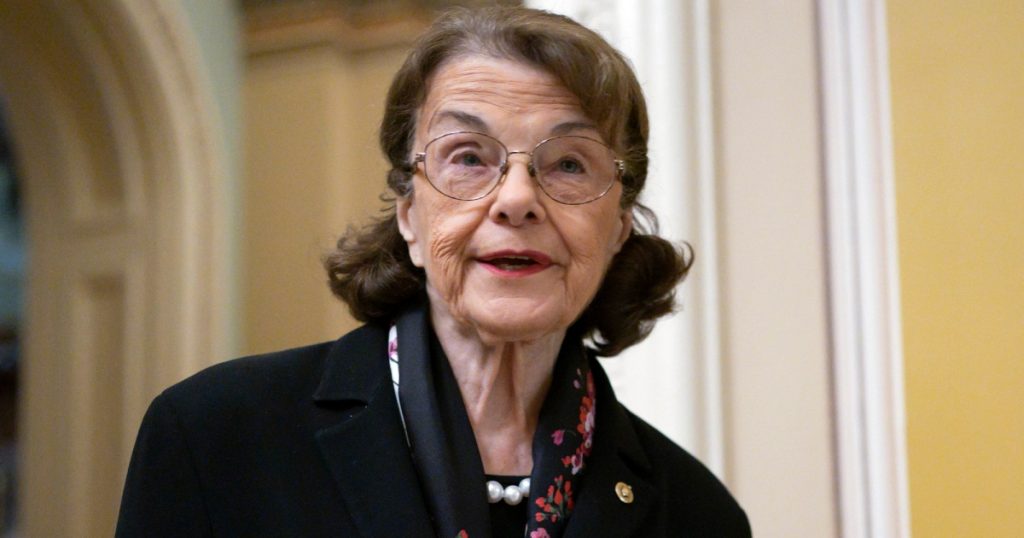Sen. Dianne Feinstein’s Saga Is a Very Public Example of a National Crisis
Sen. Dianne Feinstein, D-Calif. J. Scott Applewhite/AP Photo
Fight disinformation: Sign up for the free Mother Jones Daily newsletter and follow the news that matters.For more than a month, Sen. Dianne Feinstein (D-Calif.) has been on medical leave, with no indication of when she might return to her powerful seat on the Senate Judiciary Committee. Having missed dozens of Senate votes, she’s facing calls to resign, as her inability to do her job is obstructing President Joe Biden’s judicial nominations, among other duties. It’s just the latest installment in the saga swirling around the 89-year-old, five-term senator whose cognitive decline has been on full public display for years, even as she has refused to step down. In April last year, the San Francisco Chronicle published a story raising concerns about her mental faculties and the refusal of people around her to make her retire.
The Feinstein saga is a very public example of innumerable private crises currently taking place in millions of American households. With their pathological obsession with personal freedom, Americans are both collectively and individually failing to address the growing problem of impaired elderly people. Consider how hard it is to take away someone’s driver’s license or move a senior who’s become a hoarder into a safer living situation. It’s only going to get worse. There are millions of baby boomers who are about to join Feinstein in the ranks of dementia patients. Already, an estimated 7 million people in the US are currently living with dementia—about 1 in 10 older Americans. By 2040, that figure is expected to nearly double, but as a country, and as individuals, we still have no fucking idea how to deal with this disease. So mostly we muddle through until there’s a crisis, or, in this case, Biden can’t get his judges confirmed.
I read recently about a scandal in the UK where employees of the government’s dementia care agency were spending as little as three and a half minutes each visit with patients they visited at home. “Wow, they’re so lucky!” I thought. “They have a dementia care agency!” That’s three and a half minutes more attention than my 76-year-old mother has ever received from a government agency in the three years since she was first officially diagnosed with Alzheimer’s.
As I quickly discovered a few years ago, in the US, every family is left to reinvent the wheel when a loved one starts to lose it. Addressing someone’s dementia usually means forcing them to do something against their will, like making them leave office at 89, or move out of their home of 30 years, or taking away the car—all of which is painfully difficult and soul-crushingly sad. And the system is set up to prevent all of it, with privacy laws and legal obstacles created to protect people’s individual freedom at all costs. Americans don’t like to get up in anyone’s business and force them to do anything (unless, of course, you’re a Republican trying to ban abortion or interfere with the way people raise their trans kids). We defend to the death the rights of seriously mentally ill people to eat out of trash cans and sleep in tents on the street rather than deprive them of liberty by providing them with appropriate care in hospitals. That mentality carries over into the country’s handling of the dementia epidemic.
The typical first response to a loved one’s dementia diagnosis is denial, then avoidance, and then a lot of wishful thinking that they might be spared the emotionally wrenching and logistical nightmare of forcing an adult relative to give up their autonomy—even when clearly it’s in their best interest. As my sister and I have realized over the last three years, the first thing you discover when someone in your family gets a dementia diagnosis is just how alone you are. There’s no reliable source who tells you what to do next. There’s usually no government agency you can call for help and say, “My mother really needs to move but she’s refusing.”
In all likelihood, the only person who is empowered to make decisions for Feinstein is not another Democrat or political adviser, but her 65-year-old daughter Katherine Feinstein. But as we are seeing, leaving the entire burden of making and implementing these wrenching, fraught choices to individual family members is a formula for disaster. If you haven’t spent any time in an Alzheimer’s support group, you won’t hear anyone say this out loud, but for most people, the operative plan for a difficult loved one with dementia is to hope for a quick and merciful death before further action is required. It’s difficult to imagine that everyone around Feinstein isn’t wishing this 89-year-old woman would just go quietly in her sleep. Wouldn’t that be so much easier and more dignified for everyone—especially the senior senator from California?
But in the short term that’s not usually what happens. Indeed, people with dementia can live for years, long enough, say, to stop paying the taxes on their houses, lose the car, or blow through their savings on garbage from Facebook ads, all while resisting even the most rational requests to, perhaps, give up the car keys. Eventually, of course, people try to cope on their own, but not until, as with Feinstein, there’s a major crisis.
One high school classmate of mine finally moved his mom into his basement after she became a danger to herself. She then became a danger to him and his children when she took up smoking again and nearly set the house on fire when he went to work. Even after the smoke cleared, she kept stealing the car, so they had to lock her inside. Eventually, she went to a memory care facility, but not before everyone endured a lot of misery. Someone else I know finally got his impaired mother to move in with his family, at which point she somehow convinced total strangers that she was being held captive by a cult and they came to rescue her. Her children had to retrieve her from somewhere in Idaho, hundreds of miles away. Another family in our orbit was so paralyzed by the decline of a loved one that they only moved her once the neighbors called in social services after seeing her regularly wandering in traffic.
A social worker who runs a dementia caregiver support group recently told me, “Most of my clients wait about six months too long to move someone.” In Feinstein’s case, it’s been way more than six months, and the crisis is now upon us.
Even when people reach a point where there’s nothing to do but intervene on behalf of someone with dementia, their options are limited—one primary reason why many people wait so long. Feinstein is wealthy, so can likely access a fine memory care facility or 24-hour care at home. But because of our collective failure to respond to this growing crisis, that care is wildly out of reach financially for the average family. Medicare doesn’t pay for memory care, and neither does Medicaid unless you’ve first burned through all your assets. Unless something radical changes, most Americans with dementia are going to end up locked in someone’s basement for their own safety, usually cared for by a middle-aged daughter or daughter-in-law who quit her job to make sure the house doesn’t burn down. If you don’t believe me, just look online at the abundant offerings for baby gates for dementia patients.
Feinstein’s public drama should be a catalyst for a more meaningful and coordinated response to the coming dementia disaster from aging baby boomers so that the burden of care and decision-making doesn’t fall solely on individual families. Instead, the Democrats will wring their hands at the awkwardness, while Republicans enjoy the Democrats’ problem (and ignore their own aging legislators). And millions of American families will continue to suffer in private.





